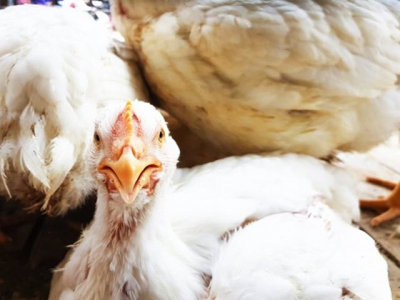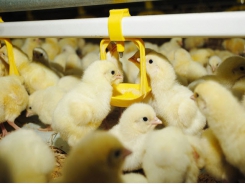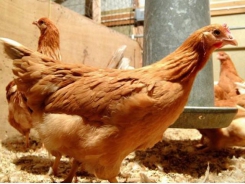Eubiotic feed additive may ease necrotic enteritis challenge in ABF birds

An eubiotic, essential oil-based feed additive may boost gut health, feed conversion and broiler chicken response to necrotic enteritis for producers working without antibiotics, says Novus researcher.
Vivek Kuttappan, research scientist with Novus International, presented the findings of a company research project looking at the use of an essential oil-based eubiotic feed additive during a disease challenge from necrotic enteritis at the International Production and Processing Expo (IPPE) in Atlanta last week.
The project was part of an effort to find new strategies to address necrotic enteritis in broiler chickens, he told us.
“NE it is a disease caused by a bacterium called clostridium perfringens and coccidiosis is a predisposing factor for incidence of the disease,” he said. “The severity of the condition can vary, sometimes it may reduce the performance in the birds, but sometimes it may be too severe and it may result in high mortality in broiler flocks.”
Some poultry farmers may face a reduction in bird performance and economic loss from the disease as they look to curb or cut antibiotics from poultry production, said Kuttappan. “It’s a challenge our customers are facing right now,” he added.
“There are restrictions on the use of antibiotics both from a regulatory point of view and [from] the customers,” he said. “So it’s mainly up to poultry nutrition right now, and people are looking at alternatives that can provide similar benefits like antibiotics.”
Necrotic enteritis research overview
The research-based effort to address necrotic enteritis started with in vitro studies looking at the effect of several of the company’s products on clostridium perfringens, said Kuttappan.
One essential oil-based product, Next Enhance 150 (NE150), demonstrated an antimicrobial effect against clostridium perfringens in the in vitro trials, he said. The feed additive includes an encapsulated blend of thymol and carvacrol.
“There is a lot of literature saying that thymol and carvacrol can have an anti-inflammatory and immunomodulating benefit in broiler birds,” he said. “And, some of the recent studies show that thymol and carvacrol can have a direct impact on coccidia oocyst.”
The hypothesis was that the feed additive would provide a benefit for broiler birds facing a necrotic enteritis challenge, he said.
"We know that the active ingredients in NE150 have a direct effect on Clostridium perfringens as well as coccidia oocyst and that it can also boost up the immune system in birds," said Kuttappan. "We conducted this study to see how it works in vivo."
“We know that it has some effect on the clostridia perfringens, some effect on the coccidia and then it can also boost up the immune system in the bird, said Kuttappan. “We wanted to test that hypothesis.”
In the disease challenge, birds were given one of three diets, said Kuttappan. These included basal diet, which was not supplemented, that diet with 60ppm of the essential oil-based feed additive and the basal diet with 500g/MT of feed of the antibiotic BMD (Bacitracin Methylene Disalicylate).
The specific antibiotic was picked because it is considered the “drug of choice” to address necrotic enteritis, he added.
“All the birds – the control, NE150 and antibiotic-treated birds – were challenged with a well-established necrotic enteritis model, which used a coccidia challenge at day 14, followed by a clostridium perfringens challenge at 19, 20 and 21 days,” he said. “Then we looked at the gut lesions caused by necrotic enteritis and also morality related to necrotic enteritis and again obviously the performance –the body weight, the feed conversion ratio and the performance index.”
Following the feeding and disease challenge trial, the researchers found that birds receiving the essential oil-based feed additive had an improved feed conversion ratio compared to the control birds, said Kuttappan.
Birds eating feed with the added antibiotic saw more improvement in feed conversion than those on the other diets, he said. “It actually showed better feed conversion ratios than the control or NE150, which was expected because that is an antibiotic,” he added.
However, both the essential oil-based and antibiotic feed additives generated similar results for reductions in gut lesions caused by necrotic enteritis and overall mortality, he said. “They were performing similarly but they were significantly better than the control group,” he added.
“It’s clear that the NE150 can reduce the severity of necrotic enteritis in broiler birds which is actually contributing to the performance benefits,” said Kuttappan. “If you look at the performance index also, which combines the feed conversion ratio, mortality and all those factors, it was also significantly improved.”
The results suggest that the eubiotic feed additive could be an alternative for producers to use in broiler diets, he said. The feed additive may “help to reduce the severity of the necrotic enteritis challenge, and improve performance and help our customers to reduce their economic loss from challenges like necrotic enteritis,” he added.
"A next step in this research would be to explore more into the changes in various tissue biomarkers and understand the exact mode of action of this product," he said.
Related news
Tools

Phối trộn thức ăn chăn nuôi

Pha dung dịch thủy canh

Định mức cho tôm ăn

Phối trộn phân bón NPK

Xác định tỷ lệ tôm sống

Chuyển đổi đơn vị phân bón

Xác định công suất sục khí

Chuyển đổi đơn vị tôm

Tính diện tích nhà kính

Tính thể tích ao



 Superdosing phytase, reduced AA may support bird gain,…
Superdosing phytase, reduced AA may support bird gain,…  Modified hens could produce medical proteins in eggs
Modified hens could produce medical proteins in eggs